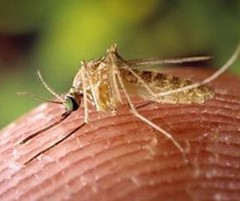 We’re currently prepping for a work-related trip to East Africa, which means we now get to spend lots of time being freaked out by ominous Centers for Disease Control warnings. (According to the CDC’s literature, setting foot in half the countries on the planet appears to be a recipe for gory death.) It also means we’ll be dedicating a lot of mental bandwidth to public health in the developing world, particularly that old bogeyman malaria. We’ve taken a keen interest in the disease ever since working on Now the Hell Will Start; our research for that book revealed that the malaria rate along the Ledo Road during its construction was a gobsmacking 995 cases per every 1,000 man.
We’re currently prepping for a work-related trip to East Africa, which means we now get to spend lots of time being freaked out by ominous Centers for Disease Control warnings. (According to the CDC’s literature, setting foot in half the countries on the planet appears to be a recipe for gory death.) It also means we’ll be dedicating a lot of mental bandwidth to public health in the developing world, particularly that old bogeyman malaria. We’ve taken a keen interest in the disease ever since working on Now the Hell Will Start; our research for that book revealed that the malaria rate along the Ledo Road during its construction was a gobsmacking 995 cases per every 1,000 man.
So we couldn’t help but highlight this potential silver-bullet solution, just recently announced by a team at the University of California at Riverside:
Anandasankar Ray, a Yale-trained neurobiologist and Stephanie Turner, a graduate research assistant, have confirmed that two common odor-causing chemicals will deaden the acute nose of malaria causing mosquitoes.
The discovery will likely result in a new class of mosquito repellants which will not need to be applied to the skin, said Ray, an assistant professor in the entomology department at UCR.
Ray said that he and Turner found that hexanol and a related odor, butanal, were strong inhibitors of carbon dioxide sensitive neurons in Culex mosquitoes, a subspecies that carries West Nile virus and filariasis, a lymphatic disease affecting 120 million worldwide.
In other words, it’s a variation on the citronella candle approach. Sounds promising, but we always have to ask—how does this method compare to the wider distribution of bed nets, both in terms of cost and efficacy? Because the more we read about antimalarial tactics, the more we become convinced that nothing can match bed nets in terms of bang-for-the-buck. So just as all human medications must be tested against placebos, so must all those fancy malaria solutions be tested against bed nets.
We do think, however, that messing with the mosquitoes nostrils seems to make more intuitive sense than pouring billions into transgenic insects.


Captured Shadow // Sep 2, 2009 at 12:36 pm
Hard to beat bed nets. (if they are good ones, I’ve been stuck under some that made risking malaria seem like a better option. I like the ones that unfold into a giant box shape so that you can sit up or stand up underneath them with long vertical sides that tuck under the mattress. The tent shaped ones are awful, they drape across you and let the mosquitoes bite through them. Insecticide treatment is a nice addition). You might consider bringing one you like on you trip, they are not very heavy.
My big hope for transgenic mosquitoes is that they could carry vaccines rather than diseases. It would be great if mosquitoes bites prevented tetanus and diphtheria.
Brendan I. Koerner // Sep 2, 2009 at 5:08 pm
Fortunately, I’m not going so far off the beaten path that bed nets won’t be readily available. At least that’s what I think–gosh, that’s probably the sorta thing I should look into before going, eh?
The big thing that’s skeeving me out is the yellow fever vaccination. Despite being somewhat well-traveled, I’ve never been to a country that required it. I’ve heard it knocks you for a loop, at least for the first 24 hours. Kind of expensive, too–just made an appt. to get one for $125, which is apparently a good deal.
I once pitched a story on transgenic mosquitoes, but was slammed down—they said it was too sci-fi. They’re loss.
Captured Shadow // Sep 3, 2009 at 1:18 am
Air Conditioned rooms, or being 5 stories above ground works really well too.
I got a yellow fever shot for a trip to Ethiopia (that got canceled, twice, so I never went.). I don’t remember it bothering me, but it was expensive.
Are you going to take any anti-malaria drugs? I took Cloroquine and Mefloquine and they both did the job, (I suppose) and also gave me some extra vivid dreams. They also seemed to prevent me from getting much tan.
Brendan I. Koerner // Sep 3, 2009 at 9:11 am
Alas, I think they’re just gonna stick me with Malarone instead of the good stuff. It’s what I took when I went to Burma, and the side effects are largely negligible.
I actually just had a back-and-forth with a pal regarding why some antimalarials give you such vivid dreams. His theory (which passes the uninformed sniff test) is that the drugs mimic the effects of a low-level version of the disease. So those dreams are a small taste of what a truly fever-stricken person experiences.